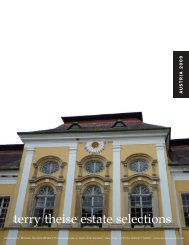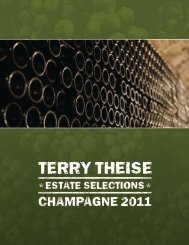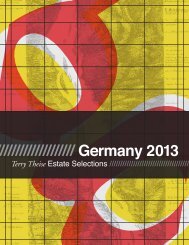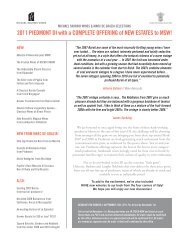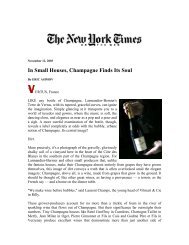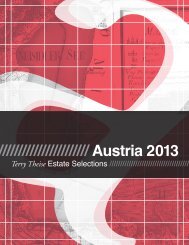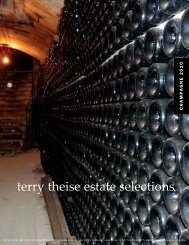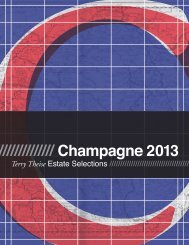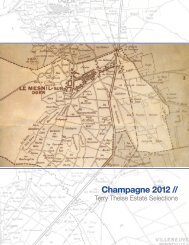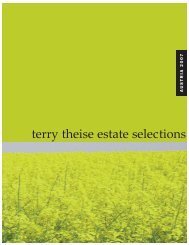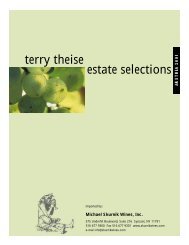German Catalog 2006 USE THIS ONE.qxp - Michael Skurnik Wines
German Catalog 2006 USE THIS ONE.qxp - Michael Skurnik Wines
German Catalog 2006 USE THIS ONE.qxp - Michael Skurnik Wines
You also want an ePaper? Increase the reach of your titles
YUMPU automatically turns print PDFs into web optimized ePapers that Google loves.
MOSEL WINES<br />
46<br />
could do was sit there blank and immobile and say What<br />
just hit me? Sometimes I think that’s when soul comes.<br />
Not when you’re busy feeling, but later when you’re tired<br />
and done with it. Soul never arrives in an envelope<br />
marked “soul”, but instead it seems to tickle you when<br />
you’re trying not to laugh.<br />
These are good times for Mosel wine lovers, with<br />
more fine producers than ever. We all have our share, my<br />
colleagues and me, and I hope we all admire all the wines<br />
“apolitically.” What I’m about to say isn’t a better-worse<br />
statement, but it’s something I deeply believe. There are<br />
no wines along the Mosel more honorable than those of<br />
Selbach-Oster. They are grounded, honest, intelligent and<br />
meaningful — like the family who produce them. Where<br />
wine is concerned I trust Johannes as I trust very few<br />
other people. He’s not only highly intelligent, he’s also<br />
smart and judicious. He has found his path. His wines<br />
have identity and purpose.<br />
Yet Selbach’s wines reward a certain attention. In<br />
short they are made to be drunk, not “tasted”. They never<br />
show off. Other wines, even very good wines, often do;<br />
like someone with a brand new BMW driving ostentatiously<br />
through town honking at the neighbors. Doesn’t<br />
mean the car’s not great. Just means the owner’s got<br />
some . . . issues.<br />
It’s tempting, you know, to strut, but Johannes is<br />
instinctively immune to sleight-of-hand winemaking. He<br />
knows exactly how it’s done, he sees other growers do it,<br />
and he simply will not. One year, there were a lot of<br />
Auslesen on the table. So much so that I asked Johannes<br />
Selbach if there was a 3-star in reserve, as I didn’t see one.<br />
Many people say many things to me during my<br />
month in <strong>German</strong>y, and I dutifully try and scribble the<br />
smart things down. Johannes’ answer stopped me in my<br />
tracks. “Terry, the 2-star Auslese was one block picking;<br />
that’s how that wine came in from that vineyard on that<br />
day,” he said. “We could concoct a 3-star Auslese of course;<br />
blend together some small lot of botrytis-wine with a little<br />
Eiswein and a little BA, but it would be a contrived wine,<br />
the kind you only create 30 liters of to send to journalists<br />
and get big scores. That’s not the business we’re in.”<br />
Listen to this, people. This is what wine means, this<br />
and only this. The vineyards didn’t create a 3-star<br />
Auslese, so there isn’t one. Simple. There’s BA and TBA<br />
and Eisweins, but no 3-star Auslese.<br />
It’s easy to blather about terroir and facile to claim<br />
the vineyard makes the wine. Johannes has acted on a<br />
principle which will cost him valuable PR, but which is<br />
the only sustainable relationship a producer can truly<br />
have to wine. I am both roused to my core and seething<br />
with frustration. Frustration? Witness: a big-Cal-red<br />
first-release called . . . oh, I like the guy personally, and<br />
it doesn’t matter what it’s called; let’s call it HUBRIS<br />
HILL . . . so Hubris Hill goes out for $125 per bottle. The<br />
“producer” doesn’t make the wine, doesn’t even own a<br />
vine, but he’s sure willing to stake a claim on your Buckand-a-quarter<br />
because he knows the world’s gone mad<br />
and a whole bunch of suckers’ll pay it, especially if it has<br />
oodles of jammy hedonistic fruit erupting from the glass in<br />
sub-atomic orgasms of delirium: 90 points.<br />
And this, we are led to believe, is wine.<br />
Wine: (n) anything anybody can contrive to make,<br />
detached from nature, detached from culture, connected<br />
to nothing but our infantile need to be entertained and<br />
our adolescent need to be fashionably correct, to be sold<br />
at the highest price some desperate hipster can be horsewhipped<br />
into paying.<br />
If this is the summit of wine’s aspirations then it<br />
wouldn’t hurt civilization if it disappeared. But I know better,<br />
and I want you to know better, and I know that we can,<br />
most of us, return to the knowledge of wine’s true claim on<br />
our hearts and bodies and souls. All of which is saturating<br />
the very filaments of air at Uferallee 23 in Zeltingen on the<br />
Mosel, where Selbach-Oster calls der schotz.<br />
“You may have noticed our wines are a bit drier the<br />
last two vintages than they used to be,” said Johannes .<br />
“We know how to make reductive fruit-bombs that get<br />
high scores and stand out in big tastings,” he continued,<br />
“but the problem is everyone writes about those wines<br />
but nobody drinks them. We want to make wines for<br />
food, that people can use in their everyday lives.”<br />
One secret is lees. The other secret is casks, the old<br />
mellow 1000-Liter casks the Moselaners call Fuders.<br />
When you ferment in cask and leave the wine in cask on<br />
its gross lees for a month or two after fermentation, your<br />
wines have wonderful plush texture and rich midpalates<br />
and they need less sweetness. They also have what<br />
Johannes calls “soul.”<br />
I drink plenty of wine with my friend Johannes and<br />
I know his tastes are broad. He likes those reductive<br />
fruit-brilliant wines. He simply prefers not to make them.<br />
He wants his wines more imbued. He wants them to<br />
make friends with you, to be companionable and useful.<br />
You can’t be friends with someone who’s showing off all<br />
the time. You can win trophies, but what would you<br />
rather have, a mantel full of trophies or a life full of<br />
friends?<br />
Many of you have met Johannes on his travels. Yet<br />
for me, his winery is perhaps the fundamental example of<br />
the difficulty of removing wine from its contexts of family<br />
and locality. From the very first, the Mosel makes an<br />
impression on you; it’s so improbable and so beautiful.<br />
And from the very first, the Selbach family made an<br />
impression on me, as they do on everyone.<br />
In my case I fell rather dazedly in love with them, or<br />
at least with an aura I had some role in reading into them.



